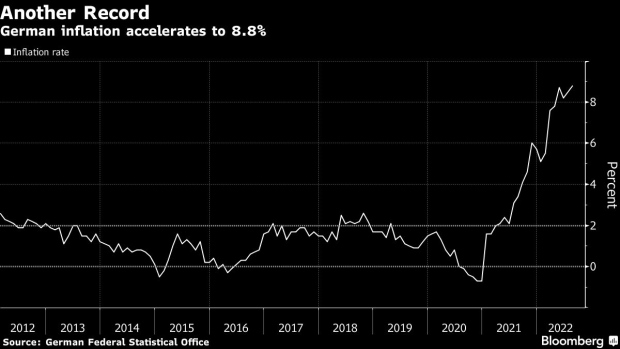Aug 30, 2022
German Inflation Accelerates to Record as ECB Weighs Next Hike
, Bloomberg News

(Bloomberg) -- Sign up for the New Economy Daily newsletter, follow us @economics and subscribe to our podcast.
German inflation accelerated to the most since the euro was introduced on soaring energy prices, bolstering calls for a jumbo interest-rate increase when the European Central Bank meets next week.
Consumer prices in Europe’s biggest economy, calculated under European Union harmonized standards, jumped 8.8% from a year ago in August, matching the median estimate in a Bloomberg survey of analysts.
Food and energy costs led the advance, Germany’s statistics office said Tuesday, though their impact was partially offset by temporary government aid, including a fuel rebate and ultra-cheap public transport.
Those measures expire soon, suggesting price growth will accelerate further. Euro-area inflation data due Wednesday are expected to show another record increase of 9%.
The Bundesbank sees Germany’s number hitting about 10% in the final quarter of 2022 and considers the outlook highly uncertain due to the “unclear situation” on commodity markets -- a consequence of Russia’s war in Ukraine.
That’s also the main concern for the continent as a whole, with the ECB facing not only the challenge of unprecedented inflation but also the resulting cost-of-living squeeze that some analysts say has already sparked a recession in the 19-nation bloc. A gauge of euro-zone economic confidence hit a 19-month low in August, data Tuesday showed.
While ECB policy makers are expected to raise rates by a half-point on Sept. 8, some have floated the idea of a bigger 75 basis-point hike akin to the more aggressive steps taken of late by the Federal Reserve.
On Tuesday, Slovenia’s Bostjan Vasle said he supports a rate increase next week that “could exceed 50 basis points,” while his Dutch colleague, Klaas Knot, urged “swift” and “forceful” action. ECB Chief Economist Philip Lane was more cautious, calling for step-by-step moves to allow households and companies to adjust.
There was positive news as European energy prices fell on European Commission plans to take urgent action. While trading remains volatile, countries in the region have also succeeded in filling natural-gas-storage facilities before the winter heating period.
Elsewhere, Spain reported a slowdown in inflation from July’s record high. Economy Minister Nadia Calvino said that trend “should continue” in the coming months, though analysts warned that any retreat will only be gradual.
(Updates with euro-zone confidence and remarks by ECB officials starting in sixth paragraph.)
©2022 Bloomberg L.P.






